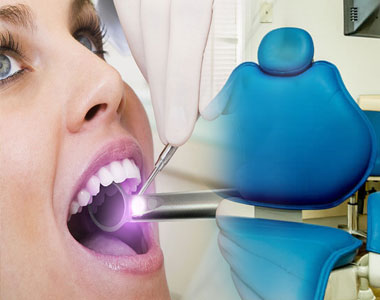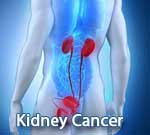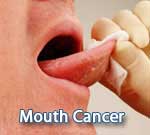Low Cost Oral Cancer Treatment in India
Treatment and Diagnosis:
If you have symptoms that suggest oral cancer, the doctor or dentist checks your mouth and throat for red or white patches, lumps, swelling, or other problems. This exam includes looking carefully at the roof of the mouth, back of the throat, and insides of the cheeks and lips. The doctor or dentist also gently pulls out your tongue so it can be checked on the sides and underneath. The floor of your mouth and lymph nodes in your neck also are checked.
If an exam shows an abnormal area, a small sample of tissue may be removed. Removing tissue to look for cancer cells is called a biopsy. Usually, a biopsy is done with local anesthesia. Sometimes, it is done under general anesthesia. A pathologist then looks at the tissue under a microscope to check for cancer cells. A biopsy is the only sure way to know if the abnormal area is cancerous.
If you need a biopsy, you may want to ask the doctor or dentist some of the following questions:
- Why do I need a biopsy?
- How much tissue do you expect to remove?
- How long will it take? Will I be awake? Will it hurt?
- How soon will I know the results?
- Are there any risks? What are the chances of infection or bleeding after the biopsy?
- How should I care for the biopsy site afterward? How long will it take to heal?
- Will I be able to eat and drink normally after the biopsy?
- If I do have cancer, who will talk with me about treatment? When?
Video - Oral Cancer Treatment | Mouth Cancer Surgery in India
Phone Numbers Reach Us -
India & International : +91 9371770341
Staging
If the biopsy shows that cancer is present, your doctor needs to know the stage (extent) of your disease to plan the best treatment. The stage is based on the size of the tumor, whether the cancer has spread and, if so, to what parts of the body.
Staging may require lab tests. It also may involve endoscopy. The doctor uses a thin, lighted tube (endoscope) to check your throat, windpipe, and lungs. The doctor inserts the endoscope through your nose or mouth. Local anesthesia is used to ease your discomfort and prevent you from gagging. Some people also may have a mild sedative. Sometimes the doctor uses general anesthesia to put a person to sleep. This exam may be done in a doctor's office, an outpatient clinic, or a hospital.
The doctor may order one or more imaging tests to learn whether the cancer has spread:
- Dental x-rays: An x-ray of your entire mouth can show whether cancer has spread to the jaw.
- Chest x-rays: Images of your chest and lungs can show whether cancer has spread to these areas.
- CT scan: An x-ray machine linked to a computer takes a series of detailed pictures of your body. You may receive an injection of dye. Tumors in the mouth, throat, neck, or elsewhere in the body show up on the CT scan.
- MRI: A powerful magnet linked to a computer is used to make detailed pictures of your body. The doctor can view these pictures on a monitor and can print them on film. An MRI can show whether oral cancer has spread
Treatment
 Many people with oral cancer want to take an active part in making decisions about their medical care. It is natural to want to learn all you can about your disease and your treatment choices. However, shock and stress after the diagnosis can make it hard to think of everything you want to ask the doctor. It often helps to make a list of questions before an appointment. To help remember what the doctor says, you may take notes or ask whether you may use a tape recorder. You may also want to have a family member or friend with you when you talk to the doctor—to take part in the discussion, to take notes, or just to listen.
Many people with oral cancer want to take an active part in making decisions about their medical care. It is natural to want to learn all you can about your disease and your treatment choices. However, shock and stress after the diagnosis can make it hard to think of everything you want to ask the doctor. It often helps to make a list of questions before an appointment. To help remember what the doctor says, you may take notes or ask whether you may use a tape recorder. You may also want to have a family member or friend with you when you talk to the doctor—to take part in the discussion, to take notes, or just to listen.
Your doctor may refer you to a specialist, or you may ask for a referral. Specialists who treat oral cancer include oral and maxillofacial surgeons, otolaryngologists (ear, nose, and throat doctors), medical oncologists, radiation oncologists, and plastic surgeons. You may be referred to a team that includes specialists in surgery, radiation therapy, or chemotherapy. Other health care professionals who may work with the specialists as a team include a dentist, speech pathologist, nutritionist, and mental health counselor.
Getting a Second Opinion
Before starting treatment, you might want a second opinion about the diagnosis and the treatment plan. Some insurance companies require a second opinion; others may cover a second opinion if you or your doctor requests it.
There are a number of ways to find a doctor for a second opinion:
- Your doctor may refer you to one or more specialists. At cancer centers, several specialists often work together as a team.
- A local or state medical or dental society, a nearby hospital, or a medical or dental school can usually provide the names of specialists in your area.
You may want to ask the doctor these questions before treatment begins:
- What is the stage of the disease? Has the cancer spread? If so, where?
- What are my treatment choices? Which do you recommend for me? Will I have more than one kind of treatment?
- What are the expected benefits of each kind of treatment?
- What are the risks and possible side effects of each treatment? How will treatment affect my normal activities? Will I be given anything to control side effects?
- How long will treatment last?
- Will I have to stay in the hospital?
- What is the treatment likely to cost? Is this treatment covered by my insurance plan?
- Would a clinical trial (research study) be appropriate for me?
- Should I try to quit smoking?
Preparing for Treatment
The choice of treatment depends mainly on your general health, where in your mouth or oropharynx the cancer began the size of the tumor, and whether the cancer has spread. Your doctor can describe your treatment choices and the expected results. You will want to consider how treatment may affect normal activities such as swallowing and talking, and whether it will change the way you look. You and your doctor can work together to develop a treatment plan that meets your needs and personal values.
You do not need to ask all your questions or understand all the answers at once. You will have other chances to ask your doctor to explain things that are not clear and to ask for more information.
Methods of Treatment
Oral cancer treatment may include surgery, radiation therapy, or chemotherapy. Some patients have a combination of treatments.
At any stage of disease, people with oral cancer may have treatment to control pain and other symptoms, to relieve the side effects of therapy, and to ease emotional and practical problems. This kind of treatment is called supportive care, symptom management, or palliative care.
Surgery
Surgery to remove the tumor in the mouth or throat is a common treatment for oral cancer. Sometimes the surgeon also removes lymph nodes in the neck. Other tissues in the mouth and neck may be removed as well. Patients may have surgery alone or in combination with radiation therapy.
You may want to ask the doctor these questions before having surgery:
- What kind of operation do you recommend for me?
- Do I need any lymph nodes removed? Why?
- How will I feel after the operation? How long will I be in the hospital?
- What are the risks of surgery?
- Will I have trouble speaking, swallowing, or eating?
- Where will the scars be? What will they look like?
- Will I have any long-term effects?
- Will I look different?
- Will I need reconstructive or plastic surgery? When can that be done?
- Will I lose my teeth? Can they be replaced? How soon?
- Will I need to see a specialist for help with my speech?
- When can I get back to my normal activities?
- How often will I need checkups?
- Would a clinical trial be appropriate for me?
Radiation Therapy
Radiation therapy (also called radiotherapy) is a type of local therapy. It affects cells only in the treated area. Radiation therapy is used alone for small tumors or for patients who cannot have surgery. It may be used before surgery to kill cancer cells and shrink the tumor. It also may be used after surgery to destroy cancer cells that may remain in the area.
Radiation therapy uses high-energy rays to kill cancer cells. Doctors use two types of radiation therapy to treat oral cancer:
- External radiation: The radiation comes from a machine. Patients go to the hospital or clinic once or twice a day, generally 5 days a week for several weeks.
- Internal radiation (implant radiation): The radiation comes from radioactive material placed in seeds, needles, or thin plastic tubes put directly in the tissue. The patient stays in the hospital. The implants remain in place for several days. Usually they are removed before the patient goes home.
Some people with oral cancer have both kinds of radiation therapy.
You may want to ask the doctor these questions before having radiation therapy:
- Which type of radiation therapy do you recommend for me? Why do I need this treatment?
- When will the treatments begin? When will they end?
- Should I see my dentist before I start treatment? If I need dental treatment, how much time does my mouth need to heal before radiation therapy starts?
- What are the risks and side effects of this treatment? What can I do about them?
- How will I feel during therapy?
- What can I do to take care of myself during therapy?
- How will my mouth and face look afterward?
- Are there any long-term effects?
- Can I continue my normal activities?
- Will I need a special diet? For how long?
- How often will I need checkups?
- Would a clinical trial be appropriate for me?
Phone Numbers Reach Us -
India & International : +91 9371770341
Chemotherapy
Chemotherapy uses anticancer drugs to kill cancer cells. It is called systemic therapy because it enters the bloodstream and can affect cancer cells throughout the body.
Chemotherapy is usually given by injection. It may be given in an outpatient part of the hospital, at the doctor's office, or at home. Rarely, a hospital stay may be needed.
You may want to ask the doctor these questions before having chemotherapy:
- Why do I need this treatment?
- Which drug or drugs will I have?
- How do the drugs work?
- Should I see my dentist before I start chemotherapy? If I need dental treatment, how much time does my mouth need to heal before the chemotherapy begins?
- What are the expected benefits of the treatment?
- What are the risks and possible side effects of treatment? What can I do about them?
- When will treatment start? When will it end?
- Will I need to stay in the hospital? How long?
- How will treatment affect my normal activities?
- Would a clinical trial be appropriate for me?
Side Effects of Cancer Treatment
Because treatment often damages healthy cells and tissues, unwanted side effects are common. These side effects depend mainly on the location of the tumor and the type and extent of the treatment. Side effects may not be the same for each person, and they may even change from one treatment session to the next. Before treatment starts, your health care team will explain possible side effects and suggest ways to help you manage them.
Surgery
It takes time to heal after surgery, and the time needed to recover is different for each person. You may be uncomfortable for the first few days after surgery. However, medicine can usually control the pain. Before surgery, you should discuss the plan for pain relief with your doctor or nurse. After surgery, your doctor can adjust the plan if you need more pain relief.
It is common to feel tired or weak for a while. Also, surgery may cause tissues in your face to swell. This swelling usually goes away within a few weeks. However, removing lymph nodes can result in swelling that lasts a long time.
Surgery to remove a small tumor in the mouth may not cause any lasting problems. For a larger tumor, however, the surgeon may remove part of the palate, tongue, or jaw. This surgery may change your ability to chew, swallow, or talk. Also, your face may look different after surgery. Reconstructive or plastic surgery may be done to rebuild the bones or tissues of the mouth.
Radiation Therapy
Almost all patients who have radiation therapy to the head and neck area develop oral side effects. That is why it is important to get the mouth in good condition before cancer treatment begins. Seeing a dentist two weeks before cancer treatment begins gives the mouth time to heal after dental work.
The side effects of radiation therapy depend mainly on the amount of radiation given. Some side effects in the mouth go away after radiation treatment ends, while others last a long time. A few side effects (such as dry mouth) may never go away.
Radiation therapy may cause some or all of these side effects:
- Dry mouth: Dry mouth can make it hard for you to eat, talk, and swallow. It can also lead to tooth decay. You may find it helpful to drink lots of water, suck ice chips or sugar-free hard candy, and use a saliva substitute to moisten your mouth.
- Tooth decay: Radiation can cause major tooth decay problems. Good mouth care can help you keep your teeth and gums healthy and can help you feel better.
- Doctors usually suggest that people gently brush their teeth, gums, and tongue with an extra-soft toothbrush and fluoride toothpaste after every meal and before bed. If brushing hurts, you can soften the bristles in warm water.
- Your dentist may suggest that you use fluoride gel before, during, and after radiation treatment.
- It also helps to rinse your mouth several times a day with a solution made from 1/4 teaspoon baking soda and 1/8 teaspoon salt in one cup of warm water. After you rinse with this solution, follow with a plain water rinse.
- Sore throat or mouth: Radiation therapy can cause painful ulcers and inflammation. Your doctor can suggest medicines to help control the pain. Your doctor also may suggest special rinses to numb the throat and mouth to help relieve the soreness. If your pain continues, you can ask your doctor about stronger medicines.
- Sore or bleeding gums: It is important to brush and floss teeth gently. You may want to avoid areas that are sore or bleeding. To protect your gums from damage, it is a good idea to avoid the use of toothpicks.
- Infection: Dry mouth and damage to the lining of the mouth from radiation therapy can cause infection to develop. It helps to check your mouth every day for sores or other changes and to tell your doctor or nurse about any mouth problems.
- Delayed healing after dental care: Radiation treatment may make it hard for tissues in the mouth to heal. It helps to have a thorough dental exam and complete all needed dental treatment well before radiation therapy begins.
- Jaw stiffness: Radiation can affect the chewing muscles and make it difficult for you to open your mouth. You can prevent or reduce jaw stiffness by exercising your jaw muscles. Health care providers often suggest opening and closing the mouth as far as possible (without causing pain) 20 times in a row, 3 times a day.
- Denture problems: Radiation therapy can change the tissues in your mouth so that dentures do not fit anymore. Because of soreness and dry mouth, some people may not be able to wear dentures for as long as one year after radiation therapy. After the tissues heal completely and your mouth is no longer sore, your dentist may need to refit or replace your dentures.
- Changes in the sense of taste and smell: During radiation therapy, food may taste or smell different.
- Changes in voice quality: Your voice may be weak at the end of the day. It may also be affected by changes in the weather. Radiation directed at the neck may cause your larynx to swell, causing voice changes and the feeling of a lump in your throat. Your doctor may suggest medicine to reduce this swelling.
- Changes in the thyroid: Radiation treatment can affect your thyroid (an organ in your neck beneath the voice box). If your thyroid does not make enough thyroid hormone, you may feel tired, gain weight, feel cold, and have dry skin and hair. Your doctor can check the level of thyroid hormone with a blood test. If the level is low, you may need to take thyroid hormone pills.
- Skin changes in the treated area: The skin in the treated area may become red or dry. Good skin care is important at this time. It is helpful to expose this area to the air while protecting it from the sun. Also, avoid wearing clothes that rub the treated area, and do not shave the treated area. You should not use lotions or creams in the treated area without your doctor's advice.
- Fatigue: You may become very tired, especially in the later weeks of radiation therapy. Resting is important, but doctors usually advise their patients to stay as active as they can.
Although the side effects of radiation therapy can be distressing, your doctor can usually treat or control them. It helps to report any problems that you are having so that your doctor can work with you to relieve them.
Chemotherapy
Chemotherapy and radiation therapy can cause some of the same side effects, including painful mouth and gums, dry mouth, infection, and changes in taste. Some anticancer drugs can also cause bleeding in the mouth and a deep pain that feels like a toothache. The problems you have depend on the type and amount of anticancer drugs you receive, and how your body reacts to them. You may have these problems only during treatment or for a short time after treatment ends.
Generally, anticancer drugs affect cells that divide rapidly. In addition to cancer cells, these rapidly dividing cells include the following:
- Blood cells: These cells fight infection, help your blood to clot, and carry oxygen to all parts of the body. When drugs affect your blood cells, you are more likely to get infections, bruise or bleed easily, and feel very weak and tired.
- Cells in hair roots: Chemotherapy can lead to hair loss. The hair grows back, but sometimes the new hair is somewhat different in color and texture.
- Cells that line the digestive tract: Chemotherapy can cause poor appetite, nausea and vomiting, diarrhea, or mouth and lip sores. Many of these side effects can be controlled with drugs
Phone Numbers Reach Us -
India & International : +91 9371770341

 English
English Arabic
Arabic French
French Bangla
Bangla Russian
Russian



































